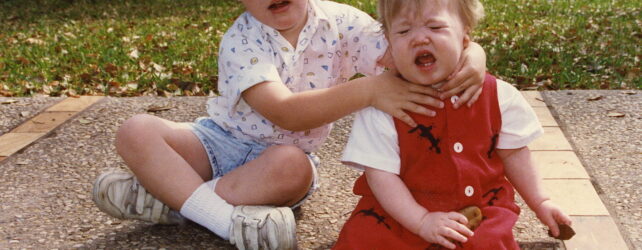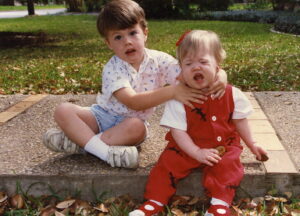“Toxic relationships bring out the worst in you.” — Anonymous
Families fighting one another happens every day, in every corner of the world … celebrities, royal families, billionaires, people like you and me — no one is immune. In my experience as a family therapist, it’s one of the most common emotional and mental health topics I hear about.
The vast majority of people I talk to are independent, adult children, and they still go back to the family gatherings trough to endure toxic , sibling relationships, parental favoritism, criticism, and a family dynamic chock full of personality traits that would be a perfect fit for a horror film. In my practice I have seen grown siblings and their aging parents be so nasty and hateful to one another that I recoiled at the lack of human decency. I can tell people that behaving in that way is unacceptable on any level, but do you think that changes anything? Of course not, because each side is so immersed in how right they are in their victimization that neither has the humility to drop the sword and say, “I don’t want to fight anymore.”
So why won’t more people fully end their familial relationships?
But they’re my parents.
Getting along with people is difficult anyway, but families are different. We will endure far more from our biological family than anyone else. The reasons why are complicated, but most of us have an inexplicable bond with our nuclear families because for better or worse, we’ve shared a lot together, and we also may have been programmed to believe that you can’t dump your family. For many, a well-known edict in the Christian religion plays a heavy part; “Thou shalt honor they father and thy mother.”
But what does that even mean, to honor they father and mother?
I’ve heard stories of parents punching children in the face, sexually molesting them, berating them mercilessly, telling them they will never amount to anything, neglecting them, blatantly favoring one sibling over the others, shameless entitlement, putting heavy expectations on them now that they’re adults, all forms of family trauma … are we required to honor these parents when we grow up?
Although I have had many a client say they feel guilty cutting their parent off, I tell them once we’re adults, we have free will to design the best life for us, whatever that means. If any human being isn’t safe to be around, has a history of injuring us verbally, physically, or peppering us with emotional abuse, we have the right to set whatever boundary we choose that is healthiest for us. You might think of it as relational sobriety. Breaking free from those who don’t restrain themselves, and living a sober life around those who have our best interest at heart.
What is guilt anyway? It is going against some belief or value you currently have. If you believe you must keep being around your family no matter how badly you’ve been treated, then you will feel guilt when you don’t go. But many of us still live by old beliefs and values that no longer serve us well. The best thing may mean reviewing and updating those beliefs and values to suit who you are today … I work with clients to consider changing their beliefs or values that keep them running back into the burning house, to play around with new beliefs that fit them better all these years later. Try out something like, “I have free choice to be around those who I choose and are healthy for me, and to not go around those who don’t restrain their words and behaviors, no matter who it is.” At the end of the day, it’s your decision to decide what’s the best policy for you moving forward.
Siblings.
When I see sibling relationships that are loving and caring, I envy it. How nourishing they must be. In my own family of five children spread out over 17 years, we were raised to compete against one another, to cruelly tease one another for laughs, to gang up against one or two to control them, to idolize our father and older siblings, and to never hold our tongues when it came to commenting on one another’s appearance, friends, academic performance, or anything else. For a youngest child like me, I never stood a chance. For me it was a war zone, and the message was, you’ll never measure up. Although being a black sheep then was the kiss of death, today I see it as having refused to go along with the dysfunction, and a badge of honor. It wasn’t until my late 20s and early 30s that I stopped go along with the pack, and to them, not living my life as they saw fit and not joining in their ugliness meant family estrangement for years at a time, but it was a first step toward becoming healthy.
Who is to blame for the sibling’s toxic behavior toward one another, and does it really matter? A parent should be on top of sibling relationships and do all they can to protect the underdogs from the pack and to prevent abuse, but in our case, our parents took part in these transactions, so there was no hope to escape it until reaching independence. This leaves a child, now grown, with a very important decision to make, to stay in contact with family members and endure narcissistic abuse or go sober and create your own family with people who would never cause you harm. If you have narcissistic parents, there will likely be a golden child and most likely, a neglected child or scapegoat. Narcissists won’t change, so hoping for a better relationship, perhaps after going to family therapy, will likely frustrate you even more. Narcissists are simply incapable of accepting responsibility or seeing their part in any negative actions. Setting boundaries with them often results in a scorched earth response leading to more estrangement episodes. When do you take an honest look at your family system and say, “I don’t need this anymore?”
If you have a toxic relationship with your siblings today that is nasty and divisive, ask yourself how did your parents encourage it, either passively or actively? Since my parents tended to rank us and criticize us behind our backs to one another, I can see where they set us up to never get along and to have intense, sibling rivalries. No one in our family was ever happy for one another’s successes. They bitterly resented you if you did well, unless you included them in it, and would tear down and disrespect whatever degree you got, whatever house you owned, or car you drove. When I lost a lot of weight in my 30s in the 1980s my family accused me of using drugs or having AIDS. To them, I never could have achieved that with hard work and exercise. When I realized that they reveled in my failures and disappointments and were skeptical of my successes, I began to wake up. To stay in their lives, I had to accept being pigeon-holed as the town idiot they viewed me as, and that was’t the sort of relationship I was willing to have anymore.
The people I once looked up to, fell off their pedestals, one by one. I noticed that I had literally been in love with my family at one time. I had been in love with people that continually caused me emotional pain, told me I was a horrible person, either directly or through insinuation, and over time destroyed my sibling bonds. As I got healthier, through counseling and my education while becoming a family therapist, my vision became crystal clear, and I realized that I could walk away without the heart tugs or longing so many of my clients talk about. It takes time to take the rose colored glasses off and stop idealizing people who don’t deserve to be admired, it takes time to finally see them as they truly are, but we will never reach true healing until we do.
Why? Because most children are full of toxic shame and see themselves as not good enough. If our families, who we often put on a pedestal in our childhood, treat us that way, too, then we quickly conclude that indeed we are defective and less than others, and low self-esteem flourishes. When we grow up and are able to process information more intelligently and accurately, we start to see that our family mistreated us through rigidity, criticism, neglect, harshness, abuse, or whatever, not because we weren’t good enough, but because there was something wrong with them. It is then that we can shed toxic shame, and get our mental and emotional health where it needs to be, which is to realize we were always valuable and enough for whatever our purpose is.
Knowing that our parents were ground zero for what our sibling relationships became, I’ve learned that my anger toward my siblings dim view of me has been somewhat misplaced, and would be more accurately be partially directed at our parents, who set us up for lifetime of contempt toward one another.
This does not excuse siblings from their share of the blame in how they treat us, but it does lighten the load of intense feelings previously directed at them. We were all victims in our own way of how we were parented. To me, half the battle of life is figuring out who is safe to be yourself with. In my case, my siblings and I will never be able to find common ground, they will never learn proper boundaries and restraint, even though they’re all quite old now, and so it is best to continue in my sobriety with those who enhance my life.
Other things to consider.
We can’t control others, we can only control ourselves, and it’s not out job to fix our family. With that in mind, some of my clients still go around their toxic family members because of family events and gatherings for holidays. One of my clients explained why she walked back into the familial burning house at least twice a year, “If I want to see the ones I like, I have to see the ones I don’t,” she said.
Another told me that they go because they have younger siblings they would never get to see if they cut off their parents. I get it, and suggested they find a way to protect themselves on these visits so that nothing about it drags them down or ruins a moment of their day. Make the visit short, keep physical distance, don’t tell them much about you or your life, view the family as a scene in a movie with a nutty cast of characters and remind yourself that what they say and do shows you who they are, and is not about you. And of course, check your breath. The average person breaths 10–12 times per minute, and my clients will report that their breaths increased to as much as 30 while at family events. Make yourself slow your breathing down. Shoot for 4 second inhales, hold for a second, then release for 4. This will help you stay calm where your best and healthiest self can be accessed.
When you should not end a family relationship.
There is one category within a family that I believe must stand by (almost) regardless, and that is when it comes to parents and children. I do not believe a parent should ever become estranged from their child, unless the child has egregiously abused or violated them in some way. For example, within the royal family, I believe King Charles should keep the door open to reconciliation with his son Prince Harry, as I believe the parent should be an example of mature relationship behavior and show a willingness to find common ground and mutual understanding. The elders need to be the hero and take the high road with their children in most cases. Children will rebel, they will do things that make us angry or crazy, but that is what kids do. I don’t agree that a parent should make a harsh stand, such as, “My way or the highway.” Parents of adults need to let their children become who they are.
One of my clients, a woman who is grown and fully independent, loves her super-religious family, and her father and mother are pastors. She tells me if they find out she is an atheist they will never speak to her again, so on her visits she pretends in order to avoid family estrangement. She should not have to do this. Prince Harry should not have to follow his family’s stringent rules in order to be accepted in the family. Both of these adult children deserve and need to be understood and accepted for how they want to live their lives.
In my opinion, Prince Harry was told, “Go along or get out.” This is the perfect plan to create family estrangement, it’s as predictable as the sun coming out each morning. That dynamic is often what leads to lethal family issues, someone else trying to control another, and the other’s resistance. The only right thing a resistor can do is to find distance and practice sobriety with those who accept them as they are, and have their best interest at heart.
Family therapy can be helpful if all parties are open-minded and reasonable. Humility is a wonderful healer when it comes to families, but it’s difficult to attain. Imagine hearing your own family member say to you, “I realize now that I treated you terribly, and I want you to know how much I regret it. I hope you can forgive me and will give me another chance to show you how much I care about you.” If a person says something like this and really means it, and follows through with a change in their perspective and behavior, then healing miracles are possible. Unfortunately, though, it’s rare.
Free will.
Once we’re grown and independent, we have the right to do whatever we want, so long as it doesn’t hurt us or anyone else. Of course, there will be consequences if we squander our personal freedom and do destructive things, as there should be. But once we’re grown, we do not have to do anything we do not want to do. You may feel obligated to your biological family, but you are not. You may be told that you owe them, but you do not. You have the choice to see and visit who you want, and to cut off whomever you choose. You don’t have to explain yourself, but you can if you want. It also means you can keep seeing whomever you want, even though it may not be healthy for you. You are the captain of your life, you get to design it.
I said at the beginning that I envied those who had close sibling relationships. At the same time, I envy only children. I can’t imagine what my life would have been like without my toxic sibling connections that affected me through the life span on so many levels. At least I went for professional help a long time ago and was able to gain a clear perspective.
If you struggle with toxic family relationships, I urge to start your journey. Know that children are innocent, and deserve to be loved, cherished and treated as the valuable and special human beings they are. If your family didn’t do that for you, that is probably the root cause of most personal mental or emotional issues or any problems with romantic relationships you might have. There is great hope for healing whether your family is in on it or not, and learning to set appropriate boundaries with everyone, especially your family, is key.
Becky Whetstone, Ph.D. is a Marriage & Family Therapist and journalist who writes about childhood developmental trauma, family relationships, and marriage crisis. She practices as a therapist in Arkansas and Texas, and as a life coach throughout the USA. Dubbed “America’s Marriage Crisis Manager,” you can follow her on You Tube, Twitter, Threads, Facebook, and Linked In. Her web sites are www.DoctorBecky.com and www.MarriageCrisisManager.com






 Becky Whetstone is an Arkansas native and has a Ph.D. in Marriage and Family Therapy from St. Mary’s University in San Antonio, Texas. She is a Licensed Marriage and Family Therapist (LMFT) in Texas and Arkansas.
Becky Whetstone is an Arkansas native and has a Ph.D. in Marriage and Family Therapy from St. Mary’s University in San Antonio, Texas. She is a Licensed Marriage and Family Therapist (LMFT) in Texas and Arkansas. 

















































































































